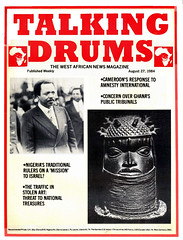Comment - Buhari's Unremitting Disaster
The obvious disadvantages of military regimes were enumerated, agonised over and discounted on the grounds that giving up personal liberties was a price worth paying for stopping the economic decline.
The personal liberties have been duly lost and more. Try as they might, the Nigerian press has lost its vibrant tone. The infamous Decree number four only put the finishing touches to the undermining of the press, for it was a forlorn hope that the Nigerian press could operate as before under a regime headed by somebody who believes that a free and vigorous press is a sign of WEAKNESS in Nigerian society.
The petty and sometimes not-so-petty harassments that come with military rule have all duly become part of the daily existence in Nigeria. State military governors have predictably become laws unto themselves and tried to impose their own quixotic laws on the people. The most spectacular example being the military governor who ordered all single women in his state to get married or else. People are learning to live with the reality that any soldier can stop any civilian on the streets and make him go through a military drill as punishment for infringing some law that had not existed until he was stopped.
All that and more, people are enduring with admirable equanimity because they know what to expect under a military regime.
The only redeeming factor that military regimes are supposed to have: getting things done in a hurry without the hindrance of constitutional safeguards, even that has not come to temper life under Gen. Buhari.
About the only thing being done in a hurry in Nigeria now is the rapid deterioration of all aspects of life. The economy especially is crumbling at such an alarming rate that if the past eight months in Nigeria had occurred under a civilian government there would have been a half dozen military take-overs already.
Whatever the Federal Military Government have touched, they have ruined and so rapidly that it is almost unbelievable. It is going to take a lifetime to re-establish public confidence in the banking system after the catastrophe of the currency exchange exercise in much the same way as it is going to take more than the repeal of Decree No. 4 to re-establish mutual confidence between journalists and public officers.
After almost eight months the only thing that can be said for Gen. Buhari is the total absence of any programme of action for the country.
Thus the disadvantages of his military rule are being endured without any benefit appearing even on the horizon. What is even worse, a new element has been entered into Nigerian life - FEAR. Obviously it is a potent weapon that has been added to the arsenal of the FMG.
This fear had been generated by many factors, the most pervasive being the fear of the unknown. Since the publication of the truth (if it embarrasses a public office can lead to two years in prison, not many people are going to allow their mouths to speak any words.
And since no reasons are being given for the wide-ranging retrenchments in the public service, there is a even more compelling reason why people have become suspicious of each other.
The feeling that you might be the next for the axe induces the most peculiar sensations in the human being.
Unless Maj-Gen. Buhari and his colleagues are sadistic, they surely cannot enjoy this state of affairs for very long; they cannot enjoy watching their fellow Nigerians degenerate into such pathetic states. For even though it undoubtedly makes life a lot easier for the FMG that fear has gripped the people and they are thus a less troublesome group to rule, in the long run, there might not be very much left for them to rule.
While the effect of all these on the civilian population is devastating enough, even more worrisome is the effect on the Nigerian armed forces as an institution ever though specific members of the forces constitute the Supreme Military Council and the Federal Military Government, the ordinary Nigerian cannot help but blame his current plight on "the soldiers".
It is not lost on people that the corporals and privates who enter the markets to enforce their own "prices" might not be members of the SMC but they derive their nerve and authority from the fact that there is a military government in the country.
Very soon, the moral superiority that the military thought they had and gave them the authority to overthrow civilians will disappear and with it, all respect from the people. After all, those who in eight months have taken prices of goods to levels undreamt of under the politicians can hardly continue to claim that they are on a rescue mission.
Then the soldiers themselves will reach the point where, instead of the current flaunting and swagger, they will not want to be seen in their uniforms outside the barracks and the song "Zombie" will get very sinister overtones again and possibly be upgraded into a Decree 4 offence.
A once proud institution will then have been reduced to the rubble that the FMG appear intent on reducing all other Nigerian institutions. The Nigerian Armed Forces, much as this paper has criticised them unremittingly, were after all created and nurtured with public money and undoubtedly have their role to play in Nigerian society.
There is now a clear danger that the increasing unpopularity of the Federal Military Government will drag down the entire Armed Forces with it. Possibly it was the fear of this which led to the recent general meeting of the Forces to discuss the performance or non-performance of the SMC thus far.
The fact that the meeting had to be abandoned in an uproar gives even greater cause for disquiet about Nigeria.
